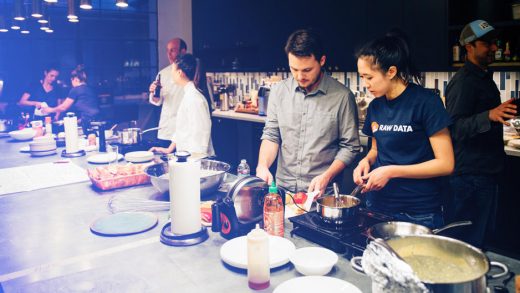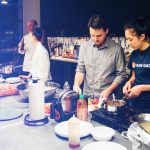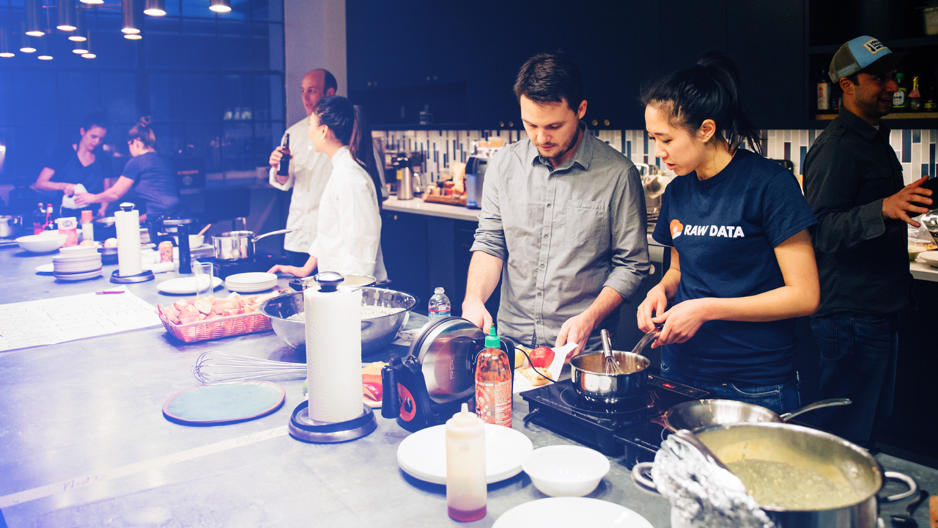Why Teams That Cook Together Work Better Together
Can channeling the adrenaline of Food Network’s Chopped or the constrained creativity of its Iron Chef, and the feedback loop of Bravo TV’s Top Chef bring teams closer and boost productivity?
A surprising number of startups are trying. From building doughnut cakes at San Francisco’s PLAE to the twice-annual BADDISH competition at New York City-based Button, to the waffle cook-off that took root on Reddit and has since spread throughout the Northern California startup scene, food-loving executives are spicing up the ways they engage employees. Chef Gordon Ramsay, host and turn-around artist of Fox’s Kitchen Nightmares, would be proud.
“PLAE” Time
Fun has to be part of the business when you market a lifestyle brand. So when the custom children’s footwear company PLAE started its quarterly cooking retreat as a team building exercise, it had to be called “People Laughing and Eating” to fit within its name. Jeff Ha, PLAE’s vice president of e-commerce, says staff would cook at home and bring in food related to their cultural roots.
What began as an informal gathering took on a more bare-knuckles edge last year after the company secured a new $7 million round of funding led by Partech Ventures in April 2015. Now two teams of on-site employees face off quarterly in what Ha describes as an “ironless” chef cook-off using only tools found around the office. Remote employees dial in as judges who rate each dish on presentation and story. A recent competition saw teams vying to build “a fancy birthday cake entirely from doughnuts,” Ha says.
Sound silly? That may be the point; Ha says PLAE’s other cofounders see the cook-off as a morale booster and “welcome distraction from the daily grind” of serving 600 retail partners, including Nordstrom, while satisfying the growth expectations of an expanding team of venture investors. PLAE has raised $10.8 million in total funding since its founding in 2013.
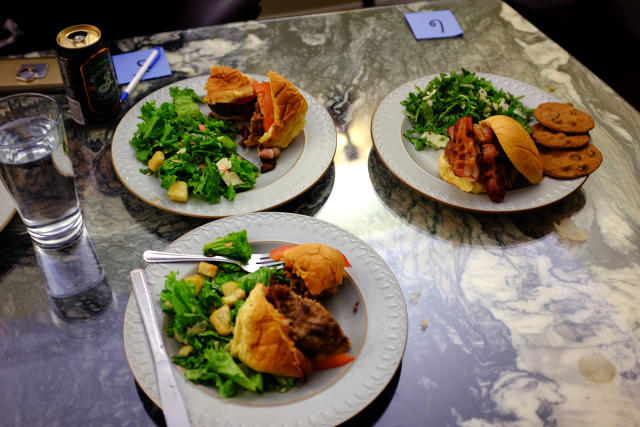
How Button Pushes Limits
While PLAE’s off-the-cuff foodie improvisation has its uses, Button, whose technology for monetizing mobile apps is backed with $16.6 million in funding from VCs and angel investors, draws from the best and worst of TV cooking shows for BADDISH, its twice-annual off-site cooking competition.
“Each team has roughly an hour to plan their meals and take a trip to the grocery store to find what they need, though some will forage for fresh produce right where they are,” says Button cofounder Stephen Milbank. Others stay and prep ingredients, cook, and plate their creations. “It’s a hectic part of the night,” he says.
Button started the competition that would become BADDISH, an acronym for “Button Amateur Dining Derby in Sag Harbor,” at its first off-site retreat in Long Island, New York, town in May of 2014. Seven employees faced off in that inaugural competition. Now, 36 staffers divide into teams that are scored by a combination of Button’s cofounders and one or more of its board members. Judges award points in five categories: presentation (up to 100), flavor (up to 250), resourcefulness (up to 100 points), creativity (up to 100 points), and team participation (up to 100 points).
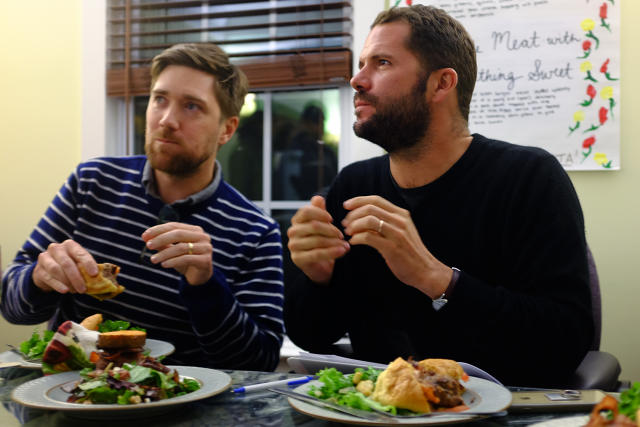
Teams get 30 seconds to pitch their finished concepts. They usually need every last one as constraints often lead to interesting or even crazy choices, like the team that used waffles instead of buns for a recent burger-and-salad cook-off.
“Sometimes the best tasting dish doesn’t satisfy all the criteria,” Milbank says. But it also doesn’t matter since BADDISH isn’t just a competition—though there are prizes and a trophy teams get to keep until the next cook-off. It’s also a form of high-pressure performance review where managers get to see employees at their best (and worst), but without suffering the consequences of market failure.
“Ultimately, it’s about teamwork, thinking creatively with one another and working under a time and budget constraint,” Milbank says. Just like any other startup trying to build a market from scratch.
Waffles Gone Wild
For Segment, a San Francisco-based startup backed by over $44 million in venture funding and specializing in making better use of customer data, food was never part of the culture until someone on the sales team started treating the company to waffles every Wednesday.
They weren’t just any waffles. He was trying different recipes and sometimes sharing the results on social media. In March, when he posted a picture of “cereal waffles” to Reddit on the r/food subreddit, hundreds of people who’d never heard of Segment suddenly wanted to know more.
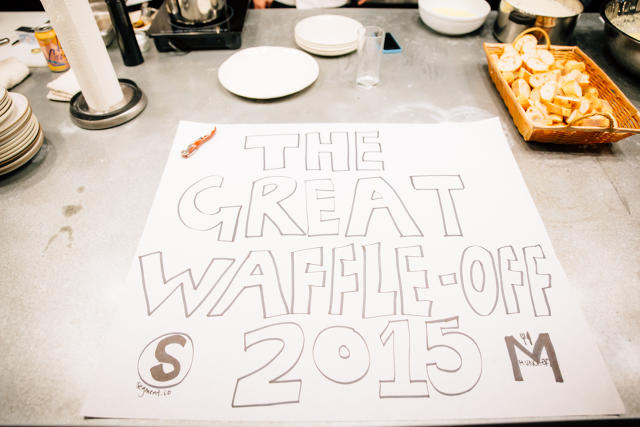
“Quite a few asked if we were hiring. We directed them to our website and jobs page, and were even more surprised when we received over 11,000 views on the same day,” says Segment VP of Human Resources, Adrianna Roche. “All in all, the cereal waffle picture has been viewed over a million times.”
Five people ended up applying for jobs at Segment as a result of the cereal waffle photo. It also inspired an instructional video that acts as an offbeat recruiting tool, as well as an annual waffle cooking competition against employees of Munchery and Stripe that’s headed into its third year. In 2015, owners of a local grocery store were pulled in to join the judge’s table and supply competitors with a secret ingredient to be infused into their creations.
Says Roche: “Next year, we plan on inviting more startups, renting an industrial kitchen, and selling tickets so we are able to donate the proceeds to charity.”
So can we call it a spin-off and get Ted Allen to host? Maybe that’s stretching the narrative too far. Either way, there’s a growing connection between startup success and kitchen chemistry, which means “cooking up growth” is no longer just an overused metaphor for success—it’s also a recipe with real stakes, real ingredients, and in some cases, tasty results.
Fast Company , Read Full Story
(21)

